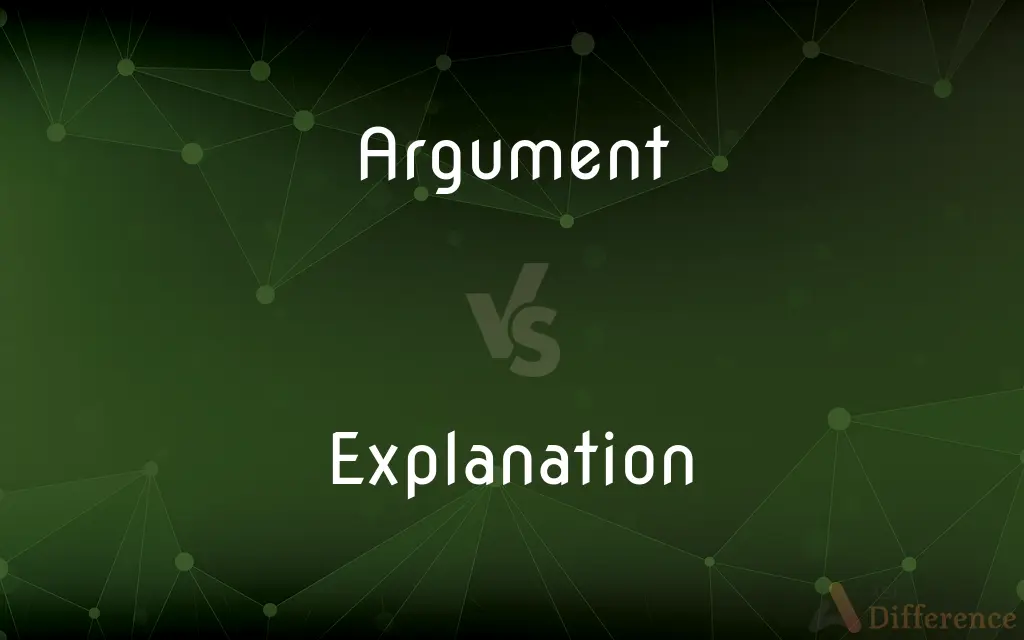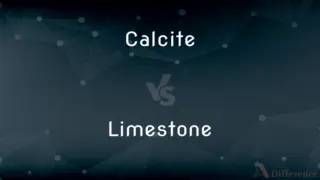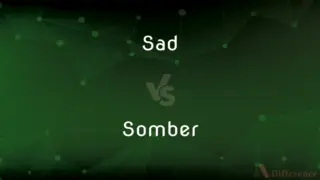Argument vs. Explanation — What's the Difference?
By Tayyaba Rehman — Updated on October 26, 2023
An argument presents a series of reasons to persuade on a particular point, while an explanation clarifies or describes a concept or event.

Difference Between Argument and Explanation
Table of Contents
ADVERTISEMENT
Key Differences
The terms Argument and Explanation both play significant roles in communication, but serve different purposes. An Argument is fundamentally about persuasion. It's a series of structured reasons or evidence presented to make someone accept a particular point or conclusion. On the other hand, an Explanation isn't about persuasion but clarity; it offers insights or details to make a concept or situation comprehensible.
When individuals engage in a debate, they put forth Arguments to defend their positions, attempting to convince others of their viewpoint. An Explanation, in contrast, might be what a teacher provides to a student who's confused about a particular topic, ensuring understanding rather than agreement.
At its core, an Argument is a tool for advocacy. It seeks acceptance, endorsement, or agreement from its audience. An Explanation, however, seeks to inform and elucidate. It's the difference between trying to convince someone why a specific scientific theory is correct (Argument) versus detailing the components of that theory (Explanation).
In everyday conversations, one might come across both. A parent might offer an Argument as to why bedtime is crucial for a child's health. Conversely, the same parent might provide an Explanation about the importance of sleep to the body's functions.
Despite their differences, Argument and Explanation are interrelated. A well-framed Argument might contain explanations to bolster its points, and an effective Explanation could be used as a foundation for a compelling argument.
ADVERTISEMENT
Comparison Chart
Primary Purpose
Persuasion
Clarification
Structure
Series of reasons or evidence
Description or elucidation
Goal
Seeks agreement or acceptance
Aims for understanding or comprehension
Context
Debates, legal cases, opinion pieces
Educational settings, answering questions
Relationship with Audience
Attempts to convince
Attempts to inform
Compare with Definitions
Argument
A series of reasons presented to persuade.
His argument against the policy was compelling.
Explanation
A statement that makes something clear.
Her explanation clarified the complex process.
Argument
A discussion involving differing points of view.
The couple had an argument about their vacation plans.
Explanation
A clarification of causes, context, or relations.
The scientist's explanation covered the experiment's results.
Argument
A summary of a book or article's theme.
The author's main argument is outlined in the introduction.
Explanation
A statement to interpret or elucidate.
The teacher sought a simple explanation for the theory.
Argument
A mathematical or logical series of statements.
The theorem's argument was difficult to follow.
Explanation
An explanation is a set of statements usually constructed to describe a set of facts which clarifies the causes, context, and consequences of those facts. This description may establish rules or laws, and may clarify the existing rules or laws in relation to any objects, or phenomena examined.Explanation, in philosophy, is a set of statements that makes intelligible the existence or occurrence of an object, event, or state of affairs.
Argument
A reason or set of reasons given in support.
She made a strong argument for adopting sustainable practices.
Explanation
The act or process of explaining
Launched into a detailed explanation.
Argument
In logic and philosophy, an argument is a series of statements (in a natural language), called the premises or premisses (both spellings are acceptable), intended to determine the degree of truth of another statement, the conclusion. The logical form of an argument in a natural language can be represented in a symbolic formal language, and independently of natural language formally defined "arguments" can be made in math and computer science.
Explanation
Something that explains
That was supposedly the explanation for their misdeeds.
Argument
An exchange of diverging or opposite views, typically a heated or angry one
There was some argument about the decision
I've had an argument with my father
Heated arguments over public spending
Explanation
A mutual clarification of misunderstandings; a reconciliation.
Argument
A reason or set of reasons given in support of an idea, action or theory
He rejected the argument that keeping the facility would be costly
There is a strong argument for submitting a formal appeal
Explanation
The act or process of explaining.
The explanation was long and drawn-out.
Argument
An independent variable associated with a function or proposition and determining its value. For example, in the expression y = F(x₁, x₂), the arguments of the function F are x₁ and x₂, and the value is y.
Explanation
Something that explains, makes understandable.
An explanation for the UFO sightings was easily found.
Argument
Any of the noun phrases in a clause that are related directly to the verb, typically the subject, direct object, and indirect object.
Explanation
A resolution of disputed points pursuant to discussion; a mutual clarification of disputed points; reconciliation.
Argument
A summary of the subject matter of a book.
Explanation
The act of explaining, expounding, or interpreting; the act of clearing from obscurity and making intelligible; as, the explanation of a passage in Scripture, or of a contract or treaty.
Argument
A discussion in which the parties involved express disagreement with one another; a debate
Philosophical arguments over the nature of existence.
Explanation
That which explains or makes clear; as, a satisfactory explanation.
Argument
An angry discussion involving disagreement among the participants; a quarrel
The roommates had an argument about whose turn it was to wash the dishes.
Explanation
The meaning attributed to anything by one who explains it; definition; interpretation; sense.
Different explanations [of the Trinity].
Argument
(Archaic) A reason or matter for dispute or contention
"sheath'd their swords for lack of argument" (Shakespeare).
Explanation
A mutual exposition of terms, meaning, or motives, with a view to adjust a misunderstanding, and reconcile differences; reconciliation; agreement; as, to come to an explanation.
Argument
A course of reasoning aimed at demonstrating truth or falsehood
Presented a strong argument for the arts in education.
Explanation
A statement that makes something comprehensible by describing the relevant structure or operation or circumstances etc.;
The explanation was very simple
I expected a brief account
Argument
A fact or statement put forth as proof or evidence; a reason
The current low mortgage rates are an argument for buying a house now.
Explanation
Thought that makes something comprehensible
Argument
A set of statements in which one follows logically as a conclusion from the others.
Explanation
The act of explaining; making something plain or intelligible;
I heard his explanation of the accident
Argument
A summary or short statement of the plot or subject of a literary work.
Explanation
A reason given for an action or event.
He provided an explanation for his tardiness.
Argument
A topic; a subject
"You and love are still my argument" (Shakespeare).
Explanation
A description of how something works.
The manual included an explanation of the device's functions.
Argument
(Logic) The minor premise in a syllogism.
Argument
The independent variable of a function.
Argument
The angle of a complex number measured from the positive horizontal axis.
Argument
(Computers) A value used to evaluate a procedure or subroutine.
Argument
(Linguistics) A word, phrase, or clause in a semantic relation with a word or phrase and that helps complete the meaning of that word or phrase, such as a noun phrase that is the object of a verb. The clause that we go is an argument of the verb suggest in the sentence I suggest that we go.
Argument
A fact or statement used to support a proposition; a reason.
Argument
A series of propositions organized so that the final proposition is a conclusion which is intended to follow logically from the preceding propositions, which function as premises.
Argument
(countable) A process of reasoning; argumentation.
Argument
(countable) An abstract or summary of the content of a literary work such as a book, a poem or a major section such as a chapter, included in the work before the content itself; (figuratively) the contents themselves.
Argument
(countable) A verbal dispute; a quarrel.
The neighbours got into an argument about the branches of the trees that extended over the fence.
Argument
Any dispute, altercation, or collision.
Steve got in a physical argument with his neighbor and came away with a black eye.
While biking home, he got in an argument with the pavement.
Argument
Any of the phrases that bears a syntactic connection to the verb of a clause.
Argument
The independent variable of a function.
Argument
The phase of a complex number.
Argument
A quantity on which the calculation of another quantity depends.
The altitude is the argument of the refraction.
Argument
A value, or a reference to a value, passed to a function.
Parameters are like labelled fillable blanks used to define a function whereas arguments are passed to a function when calling it, filling in those blanks.
Argument
A parameter at a function call; an actual parameter, as opposed to a formal parameter.
Argument
A matter in question; a business in hand.
Argument
The subject matter of an artistic representation, discourse, or writing; a theme or topic.
Argument
Evidence, proof; (countable) an item of such evidence or proof.
Argument
To put forward as an argument; to argue.
Argument
To adduce evidence, to provide proof.
Argument
Proof; evidence.
There is.. no more palpable and convincing argument of the existence of a Deity.
Why, then, is it made a badge of wit and an argument of parts for a man to commence atheist, and to cast off all belief of providence, all awe and reverence for religion?
Argument
A reason or reasons offered in proof, to induce belief, or convince the mind; reasoning expressed in words; as, an argument about, concerning, or regarding a proposition, for or in favor of it, or against it.
Argument
A process of reasoning, or a controversy made up of rational proofs; argumentation; discussion; disputation.
The argument is about things, but names.
Argument
The subject matter of a discourse, writing, or artistic representation; theme or topic; also, an abstract or summary, as of the contents of a book, chapter, poem.
You and love are still my argument.
The abstract or argument of the piece.
[Shields] with boastful argument portrayed.
Argument
Matter for question; business in hand.
Sheathed their swords for lack of argument.
Argument
The quantity on which another quantity in a table depends; as, the altitude is the argument of the refraction.
Argument
The independent variable upon whose value that of a function depends.
Argument
To make an argument; to argue.
Argument
A fact or assertion offered as evidence that something is true;
It was a strong argument that his hypothesis was true
Argument
A contentious speech act; a dispute where there is strong disagreement;
They were involved in a violent argument
Argument
A discussion in which reasons are advanced for and against some proposition or proposal;
The argument over foreign aid goes on and on
Argument
A summary of the subject or plot of a literary work or play or movie;
The editor added the argument to the poem
Argument
A variable in a logical or mathematical expression whose value determines the dependent variable; if f(x)=y, x is the independent variable
Common Curiosities
How does an Explanation differ from an Argument?
While an Argument seeks to persuade, an Explanation aims to clarify or describe a concept or event.
Can an Argument contain explanations?
Yes, a well-constructed Argument might use Explanations to reinforce its points.
Are Arguments always confrontational?
No, Arguments can be constructive and are not always confrontational. They can be tools for healthy discussion.
Can an Explanation be part of an Argument?
Absolutely, an effective Explanation can serve as a foundation or supporting detail within an Argument.
Why is structure important in an Argument?
Structure in an Argument helps organize reasons and evidence, making the case more compelling and easier to follow.
What's a common mistake people make when arguing?
A common mistake is confusing Argument with mere contradiction, rather than presenting structured reasons.
Is every disagreement an Argument?
Not necessarily. While disagreements might lead to Arguments, they can also be resolved through discussion without formal arguments.
Why do people provide Explanations?
People provide Explanations to make a concept, situation, or event comprehensible to others.
Can Explanations be subjective?
Yes, while Explanations aim to clarify, they can sometimes be influenced by personal perspectives or biases.
What is the main purpose of an Argument?
The main purpose of an Argument is persuasion, aiming to convince the audience of a particular viewpoint.
How should one approach asking for an Explanation?
It's best to approach with an open mind, seeking understanding rather than challenging the Explanation being given.
Can an Argument ever be considered "settled"?
While some Arguments can reach a consensus, others might remain open-ended, with evolving perspectives and information.
Can Explanations change over time?
Yes, as more information or understanding emerges, Explanations can evolve or be refined.
What's an example of a context where Explanation is commonly used?
An Explanation is often used in educational settings, like when teachers explain topics to students.
Are Explanations only factual?
Ideally, Explanations should be factual, but they can sometimes include interpretations or subjective elements.
Share Your Discovery

Previous Comparison
Calcite vs. Limestone
Next Comparison
Sad vs. SomberAuthor Spotlight
Written by
Tayyaba RehmanTayyaba Rehman is a distinguished writer, currently serving as a primary contributor to askdifference.com. As a researcher in semantics and etymology, Tayyaba's passion for the complexity of languages and their distinctions has found a perfect home on the platform. Tayyaba delves into the intricacies of language, distinguishing between commonly confused words and phrases, thereby providing clarity for readers worldwide.
















































